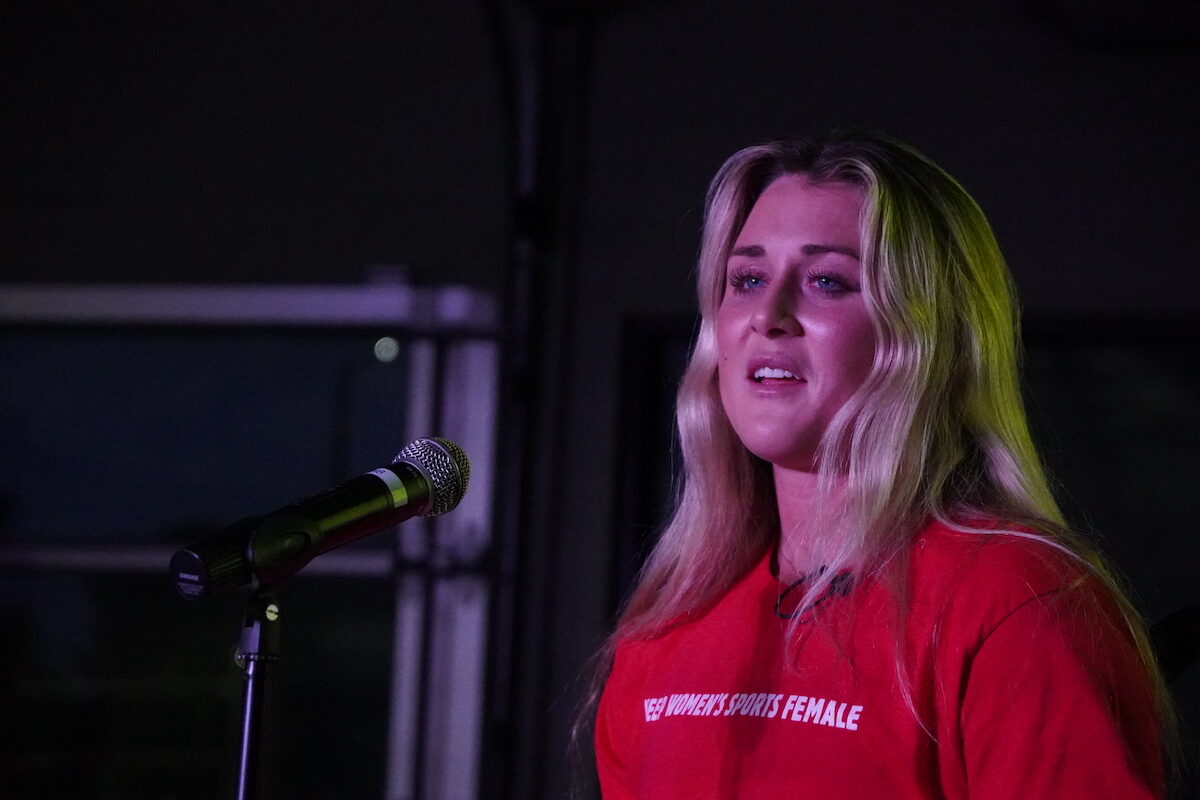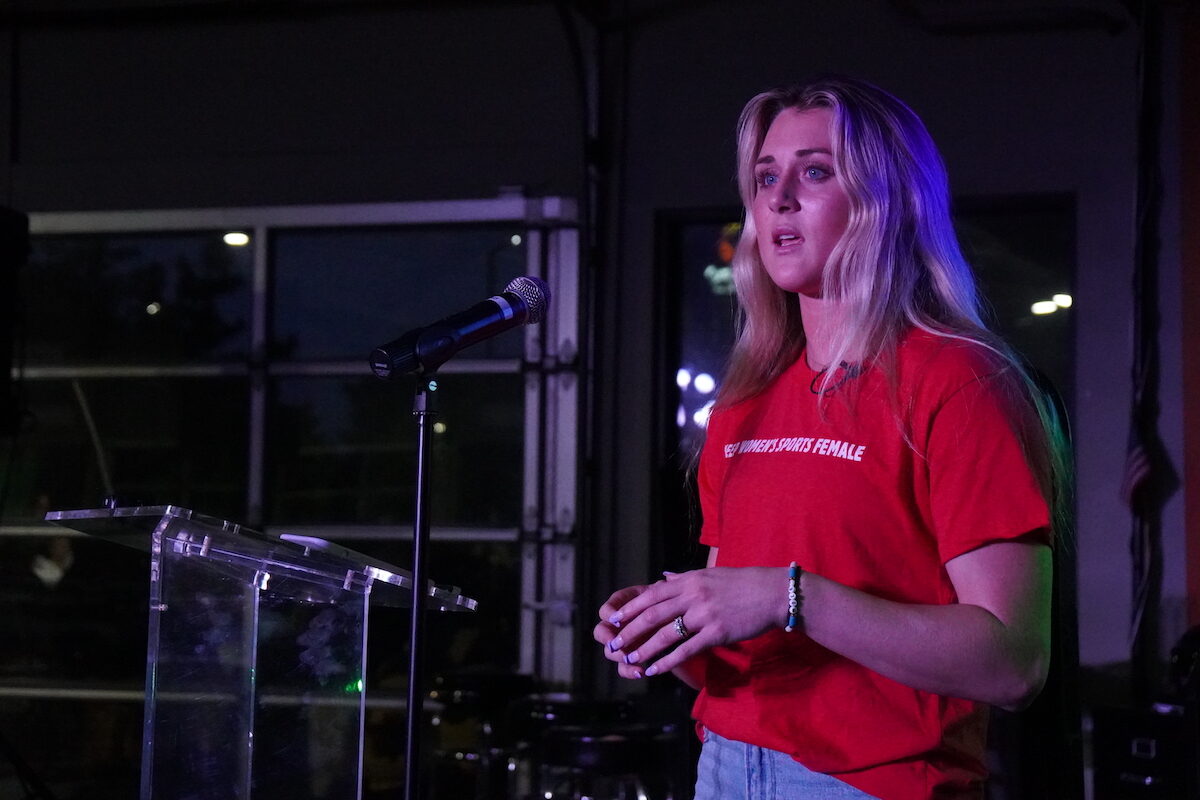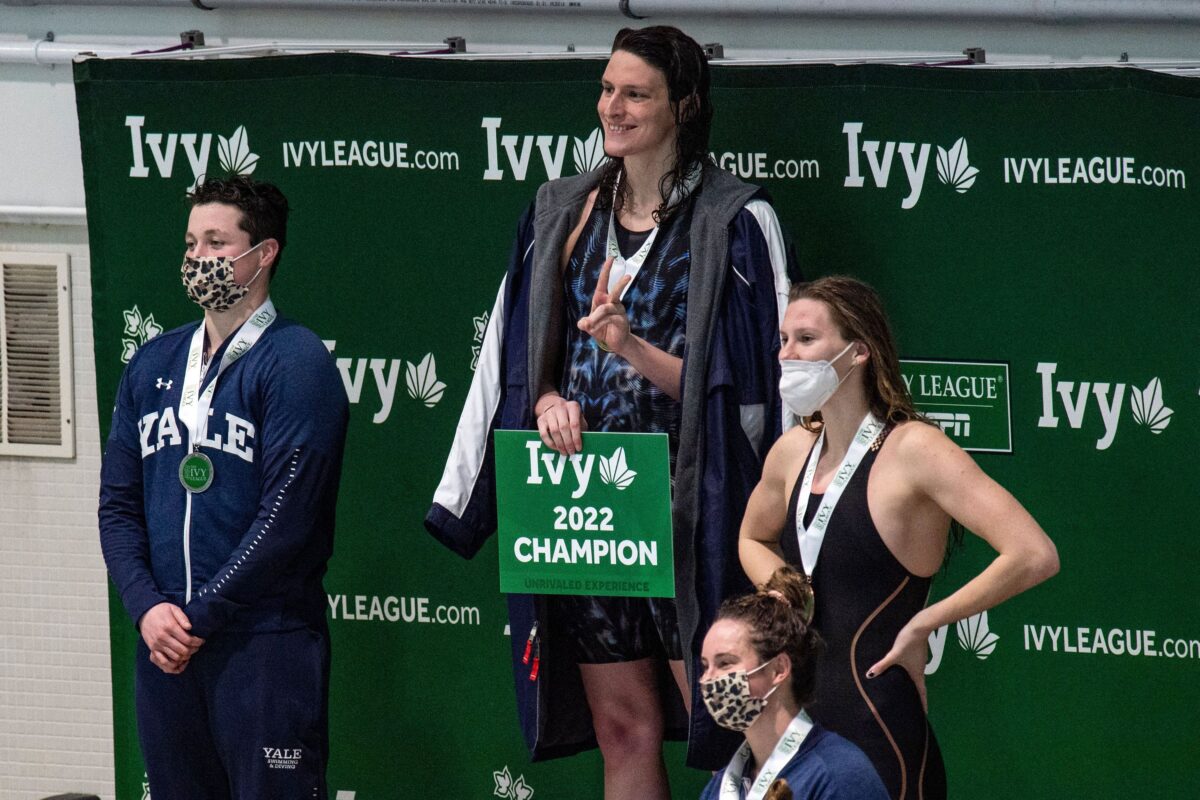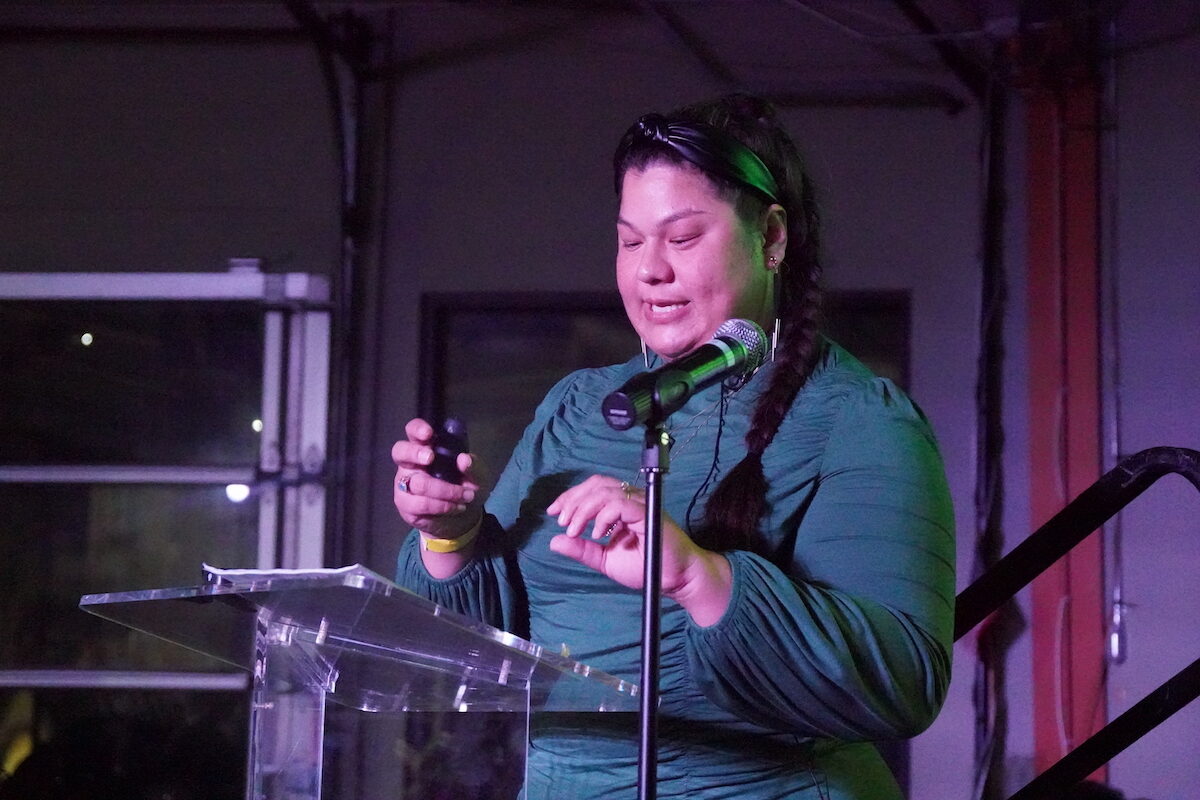


NASHVILLE, Tenn.—If female swimmers had all boycotted rather than race against a man, transgender swimmer Lia Thomas would never have entered the pool, said former professional swimmer Riley Gaines.
Speaking to a crowd of over 100 at an April 27 “Our Spaces/Our Sports: Women Hold the Line” event in Nashville, Tennessee, Gaines said that if female athletes fight back when institutions attempt to make them compete against men, they can win.
“Boycott, if we can orchestrate that in any capacity, that’s an effective way to make change,” Gaines said during a Q&A. “Of course, legislature’s there. But this is quicker.”
Activists Amy Sousa and Kay Yang also spoke about the threat transgenderism poses against women and women’s rights.
When Gaines discovered the NCAA was making her swim against a man, she and other swimmers didn’t boycott the first time because it took them off guard.
Gaines told her audience she asked an official what would happen if she refused to swim but received few options that would have allowed her to make a political statement.
“I asked him, ‘What if I don’t get on that block?’ He said, ‘That’s why we have alternates. Someone would gladly step up in your place if you don’t step on the block.'”
Then Gaines said she planned to swim but not step up to the podium.
“That’s how I’ll protest. No matter where I’ve finished, there will be an empty place on that podium,” she said. “Then we tied.”
In professional swimming, a tie down to the hundredth of a second is extremely rare, Gaines said.
Because Gaines tied with Thomas, there wouldn’t be an empty place on the podium, she said. But at the least, by standing next to Thomas she could show his massive physical advantage in height and strength.
“This will be a photo op,” Gaines said she thought at the time. “That’s what we can turn this into.”
For Gaines, racing against Thomas marked a strange end to a professional swimming career that started when she was five.
Every day in college, Gaines spent about six hours swimming, she told an attentive audience.
From an early age, life revolved around swimming, Gaines said.
“I’ve dedicated 17 years, 18 years of my life for my sport, doing everything I could to achieve maximum performance,” Gaines said. “You don’t get to go on vacations. You don’t get to have sleepovers with your friends. At the collegiate level, you didn’t get to come home for summer. You don’t come home for Christmas, no Thanksgiving. You’re there all year long.”
This life-altering dedication is normal for professional swimmers, Gaines said.
“That’s what we were willing to do because we knew that’s what it took to compete at the highest level,” she said.
The pool of women living this lifestyle is so small that top professional swimmers know each other by name, Gaines said.
“Like most sports, your top-tier athletes, regardless of where you compete in the country, you know of each other because you grew up competing against each other,” she said.
When Thomas started breaking records with all the advantages of male puberty, Gaines said she was shocked that a new swimmer could compete with athletes who had trained extensively for years.
“This person came out of nowhere in their senior year. That’s very rare,” she said.
Then she discovered Thomas was a man.
Thomas was a mediocre athlete in men’s sports, but in women’s sports, he was a prodigy, Gaines said. Thomas dominated every event from the 100-meter to the mile.
“This person was ranked first, at the top in the 100 freestyle, which is a sprint, and all the freestyle events in between until the mile, which is long distance. And so if you think of your Olympic runners, your best 200-meter runner’s not your best marathon runner; they’re totally separate systems,” she said.
In 2022, Thomas won fifth in the 200-yard freestyle with Gaines. This doesn’t just mean he got a trophy Gaines deserved to get, she said.
“I can wholeheartedly attest to the tears that I saw from ninth and 17 place finishers who missed out on being named an all-American by one place,” Gaines said.
This effectively means every woman who placed below Thomas was unjustly placed one rank lower, Gaines said.
To add insult to injury, when Gaines tied with Thomas, Thomas got the higher-placing trophy.
“We’re just doing this in chronological order,” Gaines recalled an NCAA official saying.
“Okay. Chronological about what? Because technically ‘G’ comes before ‘T,'” Gaines replied.
The official didn’t have an answer, Gaines said.
Gaines and other female swimmers had to share a locker room with Thomas too, she said.
To get into extra-tight hydrodynamic swimsuits, professional swimmers have to get naked, then slowly pull the swimsuit over every roll of skin, Gaines said.
The process can take as long as 15 minutes, she said.
At the NCAA finals, Gaines heard the locker room go silent. She turned around to see Thomas, with his male genitalia exposed, watching her fellow athletes strip to put on suits.
“You could hear a pin drop. And so I, of course, I turned around. A 6-foot-4, 22-year-old male dropping his clothes, fully intact with him exposing male genitalia, watching others undress,” she said.
“I can wholeheartedly attest to the dead silence and the extreme uncomfortableness in the locker room.”
When Gaines asked an NCAA official if Thomas was allowed into the women’s locker room, the official told her that the NCAA had changed its guidelines to make the locker room unisex.
“Any man could have walked into that locker room,” Gaines said. “We were not forewarned; we were not told. We couldn’t have even made other arrangements for ourselves.”
According to event speaker Sousa, a psychologist, there’s a word for the transgender ideology’s continued insistence that men who say they are women can enter women’s spaces. That word is “grooming.”
“Grooming is the use of charm to normalize and desensitize against increasing boundary violations over time,” Sousa said.
By teaching women that the words of transgender men overrule observed reality, the transgender ideology encourages women to ignore real dangers, Sousa said.
If a man violates women’s spaces, he is a potential sexual predator, Sousa said. It doesn’t matter if he justifies his behavior using special words like “transgender,” she added.
“When it comes to safeguarding, it’s not the responsibility of women and girls to go through some kind of complex mental analysis process to understand why this man has this certain style choice,” said Sousa. “It’s the responsibility of women and girls to protect ourselves as best we can.”
Humans and animals have an instinctive ability to recognize sex differences, Sousa noted. Transgenderism asks women to ignore this instinct.
“Every animal has these; humans are not exempt from this,” she said. “Humans can distinguish between the sexes as early as three months old. But gender ideology is interrupting these primary instincts that give us our bodily autonomy.”
On every level, Gaines said women in sports face a tide of transgender men who have unfair advantages.
“I can list stories forever. I really could,” Gaines said.
She told her audience that there are more transgender men in women’s sports than official figures suggest.
“I think there’s a statistic out there, so the NCAA has only 15 trans athletes. “Oh my gosh. I could list 15 off the top of my head. They’re underreported. They’re not recorded at all. So that’s not true,” Gaines said.
Event speaker Yang, a former LGBT activist, said the push to encourage transgenderism comes from the top.
Yang worked in a New York LGBT community center for years. Later, she became an activist against the transgender ideology because it harms children.
“No child is born in the wrong body. Teaching a child that there’s something wrong with the way that they exist in their own body is abusive,” Yang said in her speech.
Unlike other activism, the transgender movement takes its agenda from leaders at the top, Yang said.
Billionaire supporters of transgenderism include James Pritzker and Martine Rothblatt. In government, the United Nations has put enormous political power toward promoting transgenderism, Yang said.
The UN’s 2011 report on sexual orientation defined gender identity as “Each person’s deeply felt internal, individual experience of gender, which may or may not correspond with the sex assigned at birth,” Yang said.
This definition makes gender identity completely subjective, she said.
The UN’s sustainable development goals, which intend to restructure the world’s economy, society, and environment by 2030, also cite “gender equality.”
“The Sustainable Development Goals provide a blueprint for governments and organizations to implement sweeping changes to laws and policies that will gut the sex-based rights of women and girls. And they will also render the binary of sex illegible as a measurable category,” said Yang.
This international movement threatens to redefine humanity to benefit a billion-dollar global sex change industry, Yang said. Women’s sports is one of many fronts in a larger gender war, she added.
“We are not just holding the line for American women and girls. We’re holding the line for women and girls all around the world, and by extension, all of humanity,” she said.





